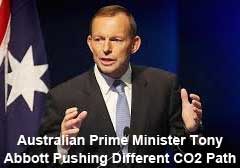In a somewhat surprising move, Australian prime minister Tony Abbott is seeking to form an alliance among "like-minded" countries, aiming to slow down if not dismantle global moves to introduce putting a price on carbon, and undermine a push by US President Barack Obama to push the case for such actions through forums such as the G20.
Abbott came to office in September of last year, in part by promising to eliminate Australia's unpopular carbon tax, which he said was hurting the country's resource-intensive economy and driving up consumer prices. That repeal effort is still under way in the country, opposed by the Labor party that controls its Senate.
Abbott hopes to build a new center-right alliance led by Canada, Britain and Australia along with India and New Zealand, and possibly others. The move comes after the new rules dramatically reducing allowed CO2 emissions from US power plants were recently proposed by the Obama administration's Environment Protection Agency, and indications that the president is going to become more active on the issue internationally.
Canada of course is very dependent on energy production for its economy. India has said in the past it is unlikely to reduce its economic growth by adhering to carbon limits. New Zealand and the UK are probably less likely to push back too hard on plans to reduce CO2 emissions, but may be willing to take a more moderate approach than the US and some other Euro countries may promote.
Abbott, who is visiting the US this week, has said that Obama's new push to reduce carbon pollution is the same type of ''direct action'' that was being pursued in Australia and which he campaigned against in his winning effort in 2013.
"We think that climate change is a significant problem, but it's not the only or even the most important problem the world faces, but it is a significant problem and its important every country should take the action that it thinks is best to address emissions,'' Abbott said at a recent press conference in Canada.
 He said it was important that policies to address CO2 output did not ''clobber the economy'' while not really helping the environment in the process. He said it was important that policies to address CO2 output did not ''clobber the economy'' while not really helping the environment in the process.
Canadian prime minister Stephen Harper seconded that notion, saying that there was no chance of any country acting for the planet if it involved costs to its economy.
''No country is going to take actions that are going to deliberately harm jobs and growth in their country, we are just a bit more frank about that than other countries," Harper said.
Australia's Morning Herald writes that "The uncompromising attitude of both leaders suggests neither is inclined to yield to pressure from the US to revive the issue of climate change ahead of next years' climate summit, nor back any international coordination such as additional regulations or a trading scheme."
These somewhat obscure machinations are all a prelude to the 2015 UN climate change meeting in Paris, in which a majority of countries have theoretically committed to agree on a global plan for reducing CO2 emissions, and for which developed countries are supposedly on the hook for sending some $100 billion annually to developing countries to help them cope with the costs of climate change and the supposed hits to their economies from largely leapfrogging the fossil fuel stage of their economic evolutions.
That will be one really interesting meeting, with huge implications for supply chains.
What do you think of Abbott's move? Let us know your thoughts at the Feedback button below.

TheGreenSupplyChain.com is now Twittering! Follow us at www.twitter.com/greenscm
|